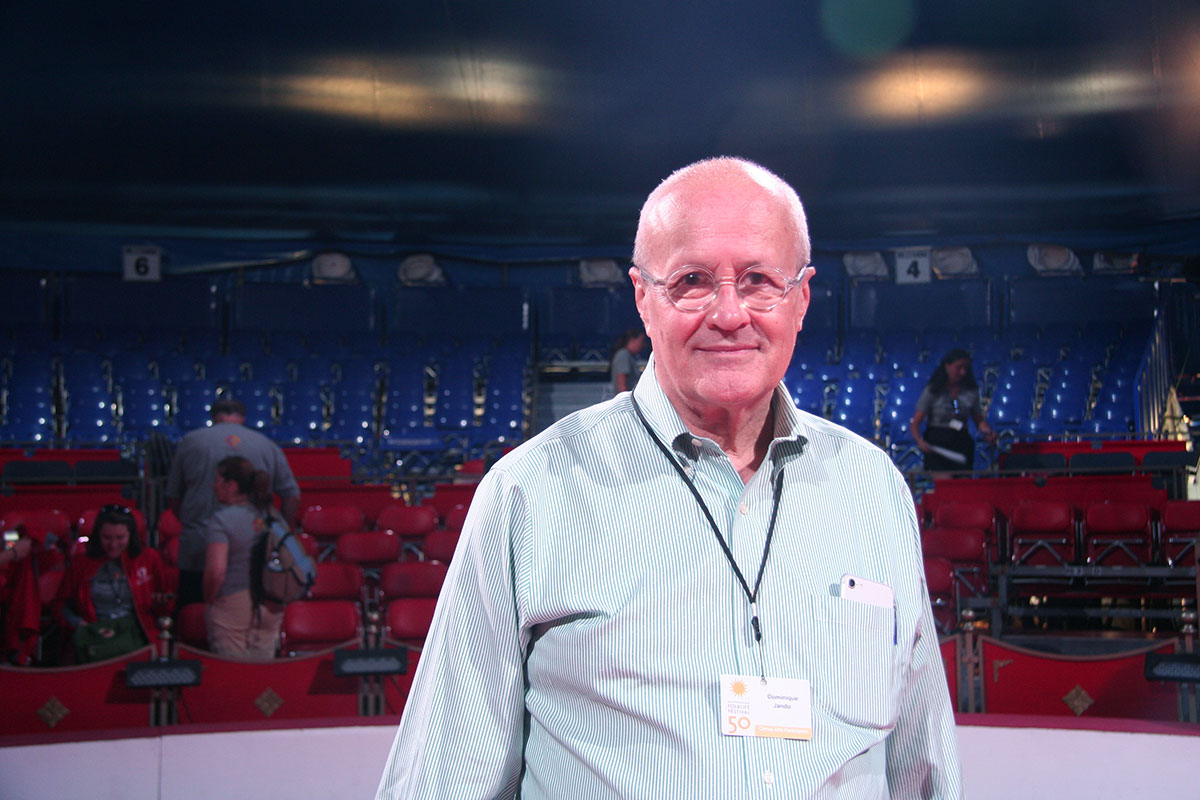The Three-Ringed Life: The Man Behind the Curtain

This series of interviews explores the lives of people in the circus and their experiences on the road. “The Three-Ringed Life” reflects the three social arenas: the personal, the professional, and the space in which the two intersect. When seen together, the three rings create a narrative as vibrant and varied as a three-ring circus.
Dominique Jando knows the circus inside and out. Born and raised in Paris, France, and now living in San Francisco, he has spent his entire adult life surrounded by the circus. In fact, he first met his wife, fellow performer Elena Panova, while judging a circus competition in which she was a contender. They later worked together in the Big Apple Circus.
Today he is a circus historian and writes extensively on the circus and its history. For the Circus Arts program, he has served as an advisory scholar and will lead discussions at the Circus Stories and Clown Alley venues.
In this excerpted interview, Jando reveals how being part of the circus can mean working behind the scenes just as much as performing under the spotlight. He describes the strength and warmth of the circus community, as well as how his experiences both on and off stage have offered insights to the world of circus.
How did you get involved in the circus?
My father was a movie producer. Before the war, he had been a journalist, and for a reason which could be too long to explain, he knew the circus and circus performers. My father went to the circus on a regular basis, and when the shows were interesting he took me to matinees. So as far as I can remember, I have been interested in the circus, and I always wanted to work in the circus.
What was your act?
Originally when I worked in the circus, I worked as a clown, and I was eighteen. Then I worked as a ringmaster. I worked as a clown for about seven, eight years, but I was always interested in the creative aspects of the show and the artistic management. At the first opportunity I had, I started doing things backstage and taking care of the show.
What kind of work did you do backstage?
For ten years, I was the general secretary of the Paris Cultural Center. There we had theater activities—ballet, and whatever—and we had the circus, Circus Gruss, which is still active and very famous in France, and we had a circus school. So I took care of that, besides the theater proper.
I came in America in 1983, I think, when I was hired by the Big Apple Circus, where I was associate artistic director for twenty years. And beside that I wrote books. I am still involved with a circus organization in Dallas, Texas, called Lone Star Circus. We produce shows at the Christmas season. I am one of the founders of the Paris festival, where Elena got her gold medal, which is called Le Festival Mondial du Cirque de Demain, “the world’s festival of the circus of tomorrow.”
At the Big Apple Circus I did the work of a talent scout, just looking at a lot of shows, finding acts, traveling, going to festivals in Europe, and so forth. I also participated in the concept of the show and the writing of the show, the production, and in my special capacity also had something to do with the marketing and the publicity.

What was the most interesting part of that job?
The most interesting of course is to find acts. That’s fascinating, just to try to find something new, to travel, to look around, to learn. What I did is, I tried to catch any show that came my way in the U.S. even if they were really bad, because you never know! Even in a bad show you can find a wonderful act or something interesting. That’s really the exciting thing, to discover new things that you didn’t know, or to see at last some act that you heard of but never saw live.
What were some of your favorite trips?
The festival which Elena was in 1987 was a very interesting moment, because it was when the circus started suddenly to evolve in new ways. There was a new crop of artists including Elena, who brought the new style which has influenced a lot the circus afterwards. 1987 was a fascinating year just for that. You saw things, and now when you go back to that, you say “that kind of style, the first time I saw that was in that festival!”
When you moved to the United States, was it hard to find a community?
I have always been in the circus community. When you are in the circus, you belong to the circus. And when you are really in the circus community, which is an international community, then you are part of the circus. If I go to Russia, everybody in the circus knows who I am, and I know who they are. If I go to France, the same. If I go to Switzerland, the same.
We are all part of the same family. We all have the same tenets and principles, we all speak the same kind of language, and we all understand things the same way, because we all have a shared experience. You are never a foreigner in the circus. Everywhere there is a circus, it is your country.
It helps you to see the world with a different lens, because you have an international experience instead of your little local experience. People are not just stuck in the political barriers or the local barriers or the geographic barriers, cultural barriers—all those things just blow off.
Julia Berley is an intern at the Center for Folklife and Cultural Heritage. She is a rising junior at Emory College of Emory University, double majoring in history and psychology.

